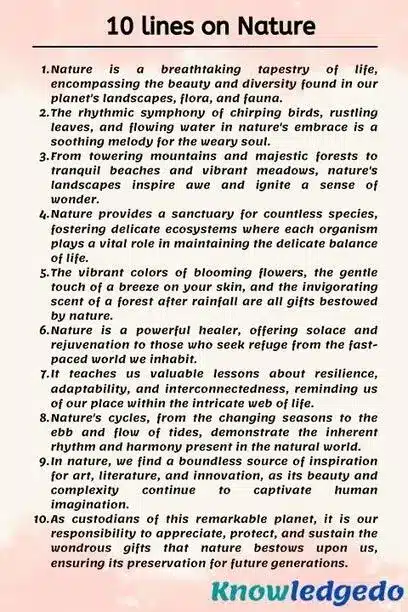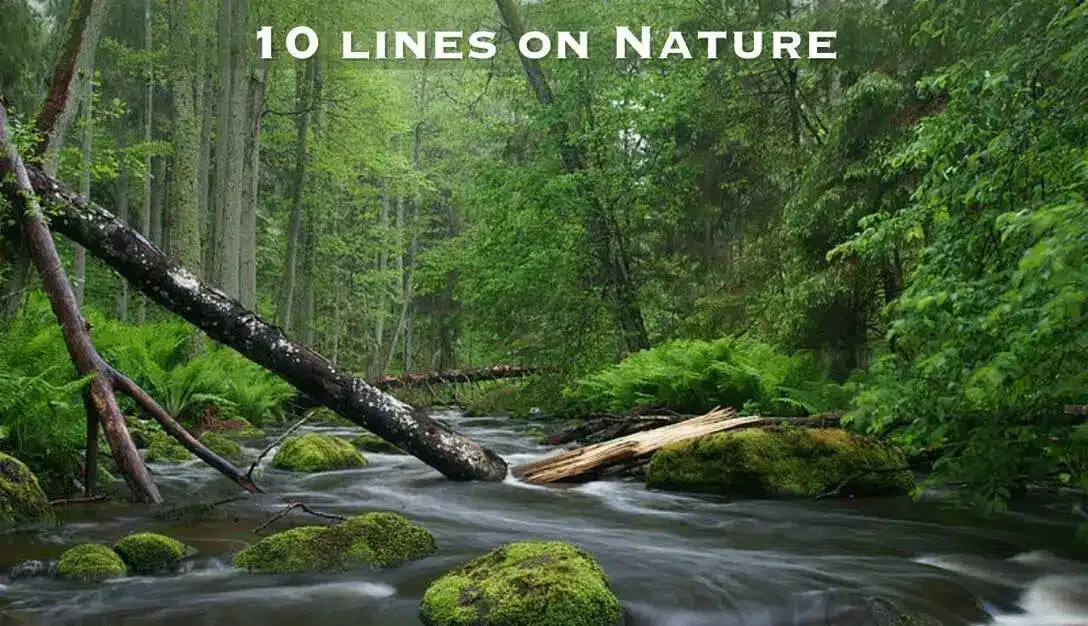Today, we are sharing 10 lines on Nature in English. This article can help students who are looking for information about 10 lines on Nature. This Lines is very simple and easy to remember. The level of these Lines is moderate so any student can write on this topic.
This article is generally useful for class 1,class 2,class 3,class 4,class 5,class 6,class 7,class 8,class 9,class 10,class 11,class 12
10 lines on Nature
1) Nature is a breathtaking tapestry of life, encompassing the beauty and diversity found in our planet’s landscapes, flora, and fauna.
2) The rhythmic symphony of chirping birds, rustling leaves, and flowing water in nature’s embrace is a soothing melody for the weary soul.
3) From towering mountains and majestic forests to tranquil beaches and vibrant meadows, nature’s landscapes inspire awe and ignite a sense of wonder.
4) Nature provides a sanctuary for countless species, fostering delicate ecosystems where each organism plays a vital role in maintaining the delicate balance of life.
5) The vibrant colours of blooming flowers, the gentle touch of a breeze on your skin, and the invigorating scent of a forest after rainfall are all gifts bestowed by nature.
6) Nature is a powerful healer, offering solace and rejuvenation to those who seek refuge from the fast-paced world we inhabit.
7) It teaches us valuable lessons about resilience, adaptability, and interconnectedness, reminding us of our place within the intricate web of life.
8) Nature’s cycles, from the changing seasons to the ebb and flow of tides, demonstrate the inherent rhythm and harmony present in the natural world.
9) In nature, we find a boundless source of inspiration for art, literature, and innovation, as its beauty and complexity continue to captivate human imagination.
10) As custodians of this remarkable planet, it is our responsibility to appreciate, protect, and sustain the wondrous gifts that nature bestows upon us, ensuring its preservation for future generations.

5 lines on nature
1) Nature is a source of tranquillity, offering solace and respite from the chaos of everyday life.
2) It is a constant reminder of the intricate and interconnected web of life, where every organism has a role to play.
3) Nature’s beauty, manifested in its diverse landscapes and vibrant flora and fauna, evokes a sense of wonder and awe.
4) It teaches us valuable lessons about resilience, adaptation, and the cyclical nature of existence.
5) Our connection to nature is fundamental, as it sustains us physically, emotionally, and spiritually, urging us to protect and preserve its delicate balance.
FAQ
Answer: Nature plays a crucial role in our well-being. Spending time in nature has been shown to reduce stress, improve mood, boost cognitive function, and enhance overall mental and physical health. It offers a sense of peace and tranquillity, providing an opportunity for relaxation and rejuvenation.
Answer: Nature is essential for environmental sustainability. It encompasses diverse ecosystems that support the balance of life on Earth. Forests, wetlands, and oceans, for example, help regulate the climate, purify air and water, provide habitat for countless species, and promote biodiversity. Protecting and restoring these natural environments is vital for the long-term sustainability of our planet.
Answer: Human activities have significant impacts on nature. Deforestation, pollution, habitat destruction, overfishing, and climate change are some of the ways in which human actions negatively affect ecosystems and biodiversity. These activities disrupt natural processes, threaten species survival, and degrade the overall health of our environment.
Answer: Individuals can contribute to the conservation of nature in several ways. Adopting sustainable practices such as reducing waste, conserving energy, and using environmentally friendly products can help minimize our ecological footprint. Supporting conservation organizations, volunteering in local restoration projects, and advocating for policies that protect natural habitats are also impactful ways to contribute to nature conservation. Additionally, fostering a connection with nature and educating others about its importance can promote a collective effort towards a more sustainable future
